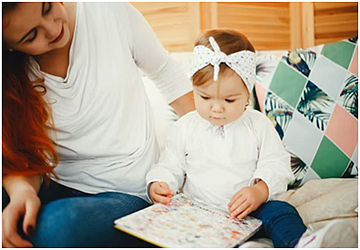In this article, we will show you the 'Top 5 Ways To Boost Your Baby's Brain Development”. Discover crucial techniques to foster your child's developing brainpower from an early age.
You may lay the groundwork for your child's future success in school, behavior, and health by encouraging healthy brain development in the first few years of life. Our 'Top 5 Ways to Boost Your Baby's Brain Development booklet contains valuable information and practical suggestions to help parents encourage their child's mental growth. As a parent, you play a crucial role in your child's growth and development, setting the stage for a lifetime of curiosity, learning, and achievement through exposure to engaging relationships, a nutritious diet, stimulating activities, sufficient sleep, and a supportive environment.

1. Interactive Communication: A Cornerstone of Infant Brain Development
The development of an infant's brain is greatly aided by social interaction and communication. Babies begin to develop skills in social interaction long before they can talk. They are learning to read your emotions via your expressions and tone of voice. Have 'conversations' with your infant brain development. Just mimic their babbling and cooing back at them. This kind of back-and-forth is like a dance for your baby's developing brain. Reading to your child is a beautiful approach to helping them learn the language. They may not understand the words, but they learn the language through the sounds and rhythms.
2. Nutritious Diet: Fuel for Baby Cognitive Growth
Your baby's nutrition has a significant effect on his or her brain development. In the first year of life, your baby will get almost all the nutrients they need from breast milk or formula. Baby cognitive growth is aided by the nutrients and antibodies included in breast milk. Ensure the meals you give your baby when they first start eating solids are high in iron, zinc, and vitamin B12. Excellent sources are lean meats, fortified cereals, and legumes.
3. Brain Boosting Activities: Nurturing Curiosity and Intellect
Your child's intelligence can develop to its full potential through participation in brain-boosting activities. Play is crucial for your baby's cognitive growth, so encourage it. From a simple game of peek-a-boo to more complex activities like building with blocks, play has many benefits for children. Providing them with age-appropriate playthings can help spark their imagination and intellectual development. Baby rattles, activity boards, and stuffed animals are great for developing your child's hand-eye coordination and motor abilities.
4. Sleep: A Crucial Part of Infant Brain Development
Infants' mental development is stunted without enough sleep. Your baby's brain is complex at work during sleep, reinforcing the neural connections that will eventually become his or her memories. Create a routine before bed to teach your infant that it's time to wind down and get some rest. A lullaby, a bedtime tale, and a relaxing bath are all possible components of this practice. Better sleep can also be encouraged by creating a peaceful and pleasant bedroom.

5. A Nurturing Environment: A Launchpad for Early Learning
Your child's early development can be significantly aided by providing a loving home. Consistent contact with adults, a stable living situation, and access to new and exciting experiences all serve as springboards for development and education. Your baby's sense of safety will improve due to your relationship with him or her being warm and receptive. Their minds and senses will benefit from exposure to new sights, sounds, and textures.
Keep in mind that children mature at their own rates. The "Top 5 Ways To Boost Your Baby's Brain Development" are helpful tips for nurturing your child's maturation. If you have any questions or concerns regarding your child's growth, don't hesitate to talk to a doctor or get early learning tips. These suggestions for early education, when combined with your intuition and affection for your child, can help you create a setting that is beneficial to your kid's mental, emotional, and bodily development.
The Importance of Sensory Experiences in Infant Brain Development
Your baby's brain cognitive stimulation development can be significantly aided by providing him or her with various sensory experiences. The five senses are the primary means by which infants gain knowledge of their environment. Providing them with various sensory activities will significantly boost their mental stimulation.
Allowing your infant to explore different textures is a great way to stimulate his or her sense of touch. Textured novels, plush toys, and blankets can all be introduced. Talk and sing to your baby often, play gentle music, or introduce toys that make different noises to stimulate their hearing.
The sense of sight is just as vital. Make use of picture books, mobiles, and other colorful playthings. Your kid can develop strong neck muscles and learn about their surroundings visually during "tummy time."
Finally, your sense of smell and taste are equally important. Remember any allergy restrictions offered by your healthcare expert when introducing new foods during weaning, and give your child a wide range of flavors and aromas to discover.
Early Learning Tips: Setting a Strong Foundation
A child's development accelerates dramatically throughout the first three years of life. How we as parents engage with our young children during this time has a profound effect on their capacity to learn. Some advice for beginning your education:
● Keep things the same because babies like routine. Keep on a regular schedule about eating, playing, and sleeping. The child's sense of security and capacity to concentrate are both enhanced by this consistency.
● Pay Attention and Respond Promptly Your infant will learn to communicate with you through sounds, facial expressions, and gestures. It reinforces their sense of worth and motivates them to keep in touch.
● Allow for Free Play Safe; unstructured play can do wonders for a child's brain development.
● Allow your child some unsupervised time in a variety of settings.
Conclusion
Developing your baby's brain is a process. Parents and caregivers should provide a loving, curious, and learning atmosphere. Your child's development can benefit from patience, love, and information. Remember that each child develops differently.
These infant brain development strategies—brain-boosting activities, a good diet, enough sleep, and a supportive environment—are essential to your baby's cognitive development. These early learning methods and a caring, engaging atmosphere will give your child the best start.







